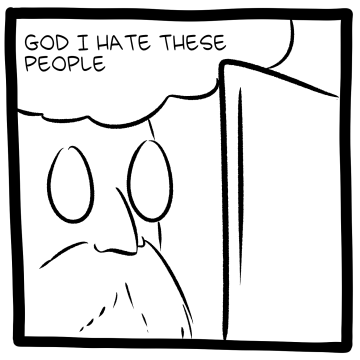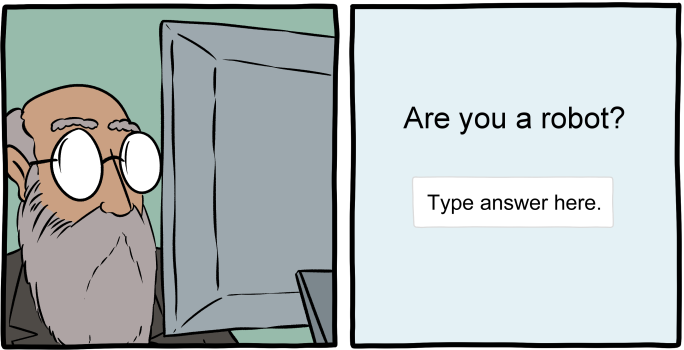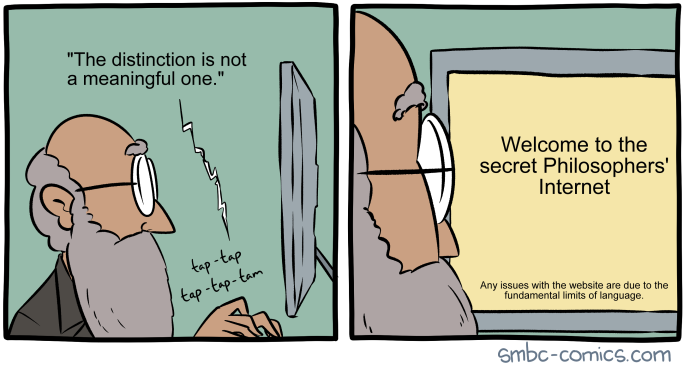Philosophical CAPTCHA
« previous post | next post »
Today's SMBC:
Mouseover title: "Of course, all the really good philosophers are yelling on twitter."
Aftercomic:

December 27, 2018 @ 4:20 pm · Filed by Mark Liberman under Linguistics in the comics
« previous post | next post »
Today's SMBC:
Mouseover title: "Of course, all the really good philosophers are yelling on twitter."
Aftercomic:

December 27, 2018 @ 4:20 pm · Filed by Mark Liberman under Linguistics in the comics
Powered By WordPress


Philip Taylor said,
December 27, 2018 @ 5:11 pm
I am clearly betraying both my prejudices and my ignorance here, but nonetheless this is intended as a serious question — does anyone ever say anything significant on Twitter, or is it simply (as I have always assumed) just a mechanism which is intended to allow the previously unrepresented silent majority to join with the chattering classes in braying in public ? I have never read anything on Twitter or Facebook, nor have I any wish to do so, so I am not in a position to be able to judge at first hand whether any real wisdom may be found on either.
Anne Cutler said,
December 27, 2018 @ 6:12 pm
@Philip Taylor: Like you I have resolutely refrained from firsthand research on your question. However, some of the journals I publish in appraise authors of something known as Altmetrics, and the contents of their reports have not always been null. Colleagues have reported the same finding. The inescapable conclusion is that someone has tweeted or posted about a paper of mine or a paper by one of my delightful colleagues. Ergo, the answer to your question has to be: yes, there is something significant (for me, anyway, and I hope for language sciences) on Twitter or other social media. Yay! I have decided to allow my knowledge to remain at this satisfying stage.
David Marjanović said,
December 27, 2018 @ 6:17 pm
I have seen heights of satire and parody on Twitter – second-hand, because I'm not on Twitter myself – that it takes more traditional media years to accumulate.
And if by "significant" you just mean important, well, President Very S. Genius recently ordered all US military personnel to leave Syria by saying so on Twitter – a day or two before James Mattis, the Secretary of Defense, got to sign a dead-tree document to that effect.
bks said,
December 27, 2018 @ 6:38 pm
Journalists live on Twitter, free from the constraints of editors.
Jerry Kindall said,
December 27, 2018 @ 7:49 pm
There are plenty of smart people writing things worth reading on Twitter, usually by working around the medium's natural limitations to post entire essays in multi-tweet threads. I assume they do this because that's where their audience looks for them.
Aaron Boyden said,
December 27, 2018 @ 8:07 pm
I'm assuming the character is supposed to be Dan Dennett? At least, he seems to be the obvious candidate, and it looks a little like him.
Gregory Kusnick said,
December 27, 2018 @ 9:44 pm
I think if Weinersmith had meant it to be Dennett, the beard would be white.
peterv said,
December 28, 2018 @ 2:55 am
@Philip Taylor:
You may enjoy this Onion parody:
https://m.youtube.com/watch?v=cqggW08BWO0
Thaomas said,
December 28, 2018 @ 3:16 am
Not on Twitter either, but I often see reproduced intelligent exchanges among economists
Philip Taylor said,
December 28, 2018 @ 11:23 am
Peter V ("You may enjoy this Onion parody"). Well, you might think it's a parody but it looks like factual reportage to me !
peterv said,
December 28, 2018 @ 2:18 pm
Philip Taylor:
Your question was serious and deserves a serious response. A common error, it seems to me, is to assume that the primary function of communication between people is to transmit information. Among many other important functions are what anthropologists call phatic functions – asserting or reminding the recipients of messages that they are connected to the sender of the message. Much of Twitter usage has a phatic quality to it.
Another important function of human communication is to revel in the clever and witty use of language itself. Banter is, without question, one of the major activities undertaken on Twitter (at least in English) and much of it is superb.
Whether or not one considers banter to be a significant use of language is probably a matter of taste. But, from the Shakespeare of the Sonnets to punster Bishop Richard Whately to comedian Peter Cook to contemporary rapsters, delight in witty banter has long been a feature of English.
Matthew J. McIrvin said,
December 28, 2018 @ 2:48 pm
I recently had an extended Twitter conversation about group theory and spinor representations of special relativity that still has me wondering about things.
L. said,
December 28, 2018 @ 5:47 pm
@Philip Taylor —
There's valuable stuff on Twitter: artists discussing their craft, lawyers explaining the exact implications of proposed policies, activists documenting protests in real time, rabbis discussing Jewish history and its contemporary implications, scholars dedicating entire threads to topics such as styles of Medieval European bookmaking, or the history of the terms "butch" and "femme" in mid-20th-century lesbian subcultures. Not to mention, as peterv did, some fantastic wordplay.
There's also, of course, plenty of nonsense, ranting, bigotry and trivia. You have to play the role of curator yourself.
PB said,
December 29, 2018 @ 7:00 am
@L. "There's valuable stuff on Twitter: artists discussing their craft, lawyers explaining the exact implications of proposed policies …" – and most of it will be lost to historians in a few years or, at most, decades, I assume…? Or is there a Twitter archiving project? I know the Internet Archive, of course, but what they're doing is periodically taking snapshots of pages on the web, which likely includes Twitter pages, but that will result in fragmentary excerpts of Twitter discussions only, I think?
Trogluddite said,
December 29, 2018 @ 2:17 pm
@PB. "…is there a Twitter archiving project?"
The US Library of Congress intended to archive every tweet ever posted, but this aim was abandoned in late 2017. Contemporary reports by researchers intending to use the data set suggested that the project was never really resourced well enough to have had much hope of success. The Library of Congress does still archive some tweets, though I know not what criteria they might be using to select which ones, and I have heard tell of various other partial archives. As you suggest, there were researchers from various disciplines who expressed concerns about the archive being selective.
mg said,
December 30, 2018 @ 12:18 am
There are some excellent discussions of disability issues on Twitter.